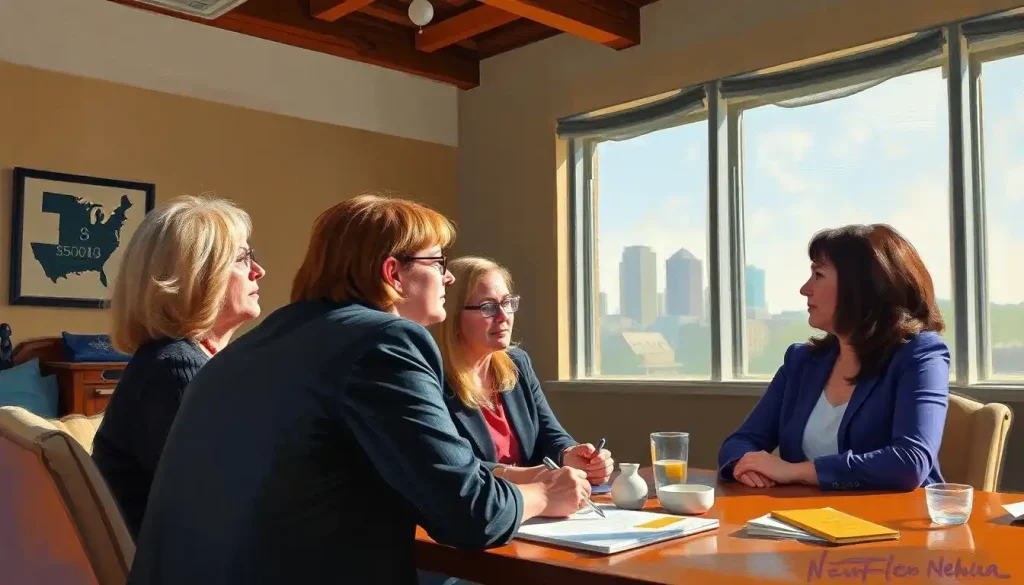While many real estate investors chase crowded markets and slim profit margins, Georgia’s hidden gem of tax lien certificates offers savvy buyers the chance to earn guaranteed returns of up to 20% annually with minimal competition. This lucrative opportunity has been flying under the radar for years, but it’s time to shed some light on this powerful investment strategy.
Imagine a world where you could invest in real estate without the hassle of property management, tenant headaches, or costly renovations. Welcome to the realm of tax lien investing in Georgia, a strategy that combines the security of government-backed investments with the potential for high returns. It’s like finding a secret passage in the maze of real estate investing, leading you to a treasure trove of opportunities.
What’s the Deal with Tax Lien Investing?
Let’s break it down in simple terms. When property owners fall behind on their taxes, local governments need a way to recoup that lost revenue. Enter tax liens. These are legal claims against a property for unpaid taxes. Instead of letting these debts languish, counties in Georgia sell these liens to investors like you and me.
Now, you might be thinking, “Wait a minute, isn’t this taking advantage of people in financial trouble?” It’s a valid concern, and it’s crucial to approach tax lien investing ethically. In fact, tax lien investing ethics is a topic worth exploring in depth. But here’s the thing: tax lien investing actually helps local governments fund essential services and gives property owners more time to pay their debts.
Georgia’s love affair with tax liens isn’t new. This system has been in place for decades, evolving to balance the needs of local governments, property owners, and investors. It’s a well-oiled machine that offers a unique blend of benefits and, yes, some risks too. But don’t worry, we’ll get into all of that.
The Georgia Tax Lien Process: A Treasure Map for Investors
So, how exactly do these magical tax liens come into existence in the Peach State? It all starts when a property owner misses their tax payment deadline. The county then places a lien on the property, essentially saying, “Hey, you owe us money, and we’re not forgetting about it!”
But here’s where it gets interesting. Instead of playing the waiting game, Georgia counties hold tax lien sales. Picture an auction, but instead of antiques or artwork, you’re bidding on the right to collect those unpaid taxes. It’s like a real estate version of Storage Wars, but with a lot more predictability and a lot less junk to sort through.
These sales can happen in person or online, depending on the county. Some counties even use a lottery system to keep things fair. The types of properties up for grabs? They run the gamut from residential homes to commercial buildings and even vacant lots. It’s like a real estate buffet, and you get to pick your favorite dish.
Now, here’s the sweet part. In Georgia, the property owner has a chance to redeem their property by paying the overdue taxes plus interest. And that interest? It’s where you, the investor, can really shine. We’re talking rates that can go up to 20% annually. Try getting that from your savings account!
But what if the owner doesn’t pay up? Well, that’s when things get really interesting. After a certain period (usually about a year in Georgia), you might have the opportunity to foreclose on the property. Suddenly, that tax lien certificate could turn into full property ownership. It’s like buying a lottery ticket that could win you a house!
Getting Your Feet Wet in Georgia’s Tax Lien Pool
Alright, so you’re intrigued. You’re ready to dip your toes into the tax lien waters. But where do you start? First things first: research, research, research. It’s not as exciting as bidding at an auction, but trust me, it’s the foundation of your success.
Start by familiarizing yourself with Georgia’s counties. Each one has its own quirks and procedures. Some might be more investor-friendly than others. It’s like choosing which game to play at a casino – you want to know the rules and odds before you place your bet.
Next up: registration. Most counties require you to register before participating in tax lien sales. It’s usually a straightforward process, but don’t leave it to the last minute. Nothing’s worse than missing out on a great opportunity because you forgot to dot an ‘i’ or cross a ‘t’.
Now, let’s talk money. How are you going to finance your tax lien purchases? Some investors use cash, while others leverage lines of credit or partner with other investors. There’s no one-size-fits-all approach here. It’s about finding what works for your financial situation and goals.
Developing a bidding strategy is crucial. Some investors go for quantity, snatching up as many liens as possible. Others prefer quality, focusing on high-value properties or specific neighborhoods. It’s like choosing between being a Jack of all trades or a master of one. Both can work, but you need to know which suits your style.
Navigating the Legal Landscape of Georgia Tax Liens
Now, I know legal talk can be about as exciting as watching paint dry, but stick with me here. Understanding the legal side of tax lien investing in Georgia is like having a good map when you’re exploring new territory. It keeps you from getting lost or stepping into quicksand.
Georgia has its own set of laws governing tax lien investing. These laws outline everything from how sales are conducted to what rights you have as a certificate holder. It’s not exactly beach reading, but familiarizing yourself with these laws can save you a world of trouble down the line.
As a tax lien certificate holder, you have both rights and responsibilities. You have the right to collect interest and potentially foreclose on the property. But you also have responsibilities, like properly notifying the property owner of your lien. It’s a bit like being a landlord, but without having to fix leaky faucets at 2 AM.
Legal challenges can pop up, especially if you’re not dotting your i’s and crossing your t’s. Property owners might contest the lien, or there could be issues with the sale process. The key is to do everything by the book and keep meticulous records. Think of it as building a legal fortress around your investment.
Working with local county tax offices is part of the game. These folks can be your best friends or your worst enemies, depending on how you approach them. Be respectful, follow their procedures, and don’t be afraid to ask questions. They’re usually happy to help investors who are trying to do things the right way.
Managing Your Georgia Tax Lien Portfolio: More Than Just Collecting Checks
So, you’ve successfully bid on some tax liens. Congratulations! But don’t think you can just sit back and watch the money roll in. Managing your tax lien investments is an active process, kind of like tending a garden. Neglect it, and weeds might take over.
Tracking redemption periods and interest payments is crucial. Each lien has its own timeline, and you need to stay on top of it. Some investors use spreadsheets, while others opt for specialized software. Whatever method you choose, make sure it’s organized and up-to-date. It’s like keeping a diary of your investment’s life story.
When a property owner redeems their lien, it’s payday for you. But don’t just cash the check and move on. This is a chance to analyze your investment. How long did it take? What was your actual return? Use this information to refine your strategy for future purchases.
But what if the property isn’t redeemed? This is where things can get really interesting. You might have the opportunity to foreclose and take ownership of the property. It’s like turning a caterpillar into a butterfly – your paper investment could transform into a tangible asset.
If you do end up owning properties through foreclosure, welcome to the world of property management. This might involve renovations, finding tenants, or even selling the property. It’s a whole new ball game, but it can also lead to substantial profits if done right.
Advanced Strategies: Taking Your Tax Lien Game to the Next Level
Once you’ve got the basics down, it’s time to level up your tax lien investing game. This is where the real pros separate themselves from the amateurs. It’s like moving from checkers to chess – same board, but a whole new level of strategy.
One advanced approach is targeting specific counties or property types. Maybe you’ve noticed that liens in a particular county tend to redeem quickly. Or perhaps you’ve had success with commercial properties. Specializing can help you develop expertise and potentially increase your returns.
Bulk purchasing of tax liens is another strategy to consider. Some counties offer bulk sales, where you can buy multiple liens at once. It’s like buying in bulk at Costco – you might get a better deal, but you need to be prepared to handle the volume.
Technology is your friend in the tax lien world. There are tools and software available that can help with everything from property research to portfolio management. Embracing these can give you an edge over less tech-savvy investors. It’s like bringing a smartphone to a game of trivia night – you’ve got a world of information at your fingertips.
Partnering with other investors or forming investment groups can also open up new opportunities. It allows you to pool resources and knowledge, potentially tackling larger or more complex investments. Just remember, choosing partners is like choosing a roommate – make sure you’re compatible before you commit.
The Road Ahead: Your Journey in Georgia Tax Lien Investing
As we wrap up this whirlwind tour of tax lien investing in Georgia, let’s recap some key points. Success in this field comes down to thorough research, careful strategy, and diligent management. It’s not a get-rich-quick scheme, but rather a methodical approach to building wealth through real estate-backed investments.
The potential returns in Georgia’s tax lien market are enticing, with interest rates that can make traditional investments look like pocket change. But remember, with great potential comes some risk. It’s crucial to approach this strategy with eyes wide open, understanding both the opportunities and the pitfalls.
If you’re intrigued by tax lien investing but not sure if Georgia is the right fit, don’t worry. There are opportunities across the country. For instance, tax lien investing in Maryland offers its own unique landscape. Or you might want to explore tax lien investing in Florida, known for its robust real estate market. Each state has its own rules and quirks, so it’s worth exploring your options.
For those just starting out, tax lien investing for beginners can seem daunting. But remember, every expert was once a novice. The key is to start small, learn continuously, and gradually expand your portfolio as you gain experience and confidence.
It’s also worth noting that tax lien investing is just one strategy in the broader world of real estate investing. You might want to compare it with tax deed investing, which involves purchasing the property outright at a tax sale. Some investors even combine tax lien and tax deed investing strategies for a diversified approach.
As you embark on your tax lien investing journey in Georgia, remember that knowledge is power. Stay informed about market trends, legal changes, and economic factors that could impact your investments. Network with other investors, attend seminars, and never stop learning.
And finally, always keep ethics at the forefront of your investing strategy. While tax lien investing can be highly profitable, it’s important to approach it with integrity and compassion. After all, behind every lien is a property owner facing financial challenges. By investing responsibly and ethically, you can create a win-win situation that benefits you, the property owner, and the local community.
So, are you ready to unlock the potential of tax lien investing in Georgia? With its combination of high returns, minimal competition, and the backing of government-issued certificates, it’s an opportunity that’s hard to ignore. Just remember, like any investment, it requires dedication, education, and a bit of courage. But for those willing to put in the work, the rewards can be substantial. Happy investing!
References:
1. Georgia Department of Revenue. “Property Tax Guide for Georgia Taxpayers.” Available at: https://dor.georgia.gov/property-tax-guide-georgia-taxpayers
2. National Tax Lien Association. “Tax Lien Investing.” Available at: https://ntla.org/
3. Stein, R. (2017). “The Complete Guide to Investing in Real Estate Tax Liens & Deeds.” Atlantic Publishing Group, Inc.
4. Georgia General Assembly. “Official Code of Georgia Annotated (O.C.G.A.) – Title 48. Revenue and Taxation.” Available at: https://www.legis.ga.gov/
5. U.S. Census Bureau. “Georgia QuickFacts.” Available at: https://www.census.gov/quickfacts/GA
6. Federal Reserve Bank of Atlanta. “Georgia’s Economy.” Available at: https://www.atlantafed.org/economy-matters/regional-economics/georgia
7. National Association of Counties. “County Explorer: Georgia.” Available at: https://ce.naco.org/?dset=Property%20Taxes&ind=Property%20Tax%20Revenue%20per%20Capita
8. Georgia Association of Assessing Officials. “Property Tax Resources.” Available at: https://www.gaao.org/
9. Urban Institute. “State and Local Finance Initiative: Georgia.” Available at: https://www.urban.org/policy-centers/cross-center-initiatives/state-and-local-finance-initiative/projects/state-fiscal-briefs/georgia
10. Investopedia. “Tax Lien Investing.” Available at: https://www.investopedia.com/terms/t/taxlieninvesting.asp












Would you like to add any comments? (optional)